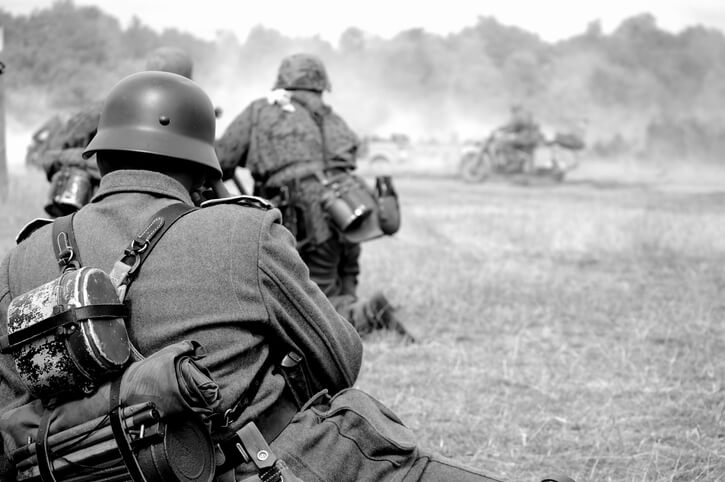World War II started 80 years ago today with the German invasion of Poland. It ended six years later, with over 70 million dead.
I would argue hubris was a significant contributor to World War II. Hubris is the wanton insolence or arrogance resulting from excessive pride or passion. It is the classic temptation of mortals who, finding themselves garbed in the unaccustomed robes of leadership or success, start imagining themselves bulletproofed against disaster — and so tempt the fates. Their own belief that they will prevail is enough to qualify as excessive hubris when they are defeated.
I believe that there is a theme of hubris in the cause of the war and the eventual outcome, as set out below:
-
World War I. Russian hubris started the war. However, the arrogance of the British, French, and Germans encouraged it as each believed in they were right, and they would win the war quickly. Four and half years later and 40 million dead was the cost.
-
The Treaty of Versailles, due to the hubris of the victors, included the War Guilt clause, which John Maynard Keynes referred to as a “Carthaginian peace.” Although there were anti-war rallies at the end of World War I in Germany, many Germans remembered the humiliation of the War Guilt clause. It was this humiliation that made it easier for Hitler to convince the German people that there was a need for more war in the lead up to World War II.
-
German rearmament, in violation of the Treaty of Versailles, began shortly after the Treaty was signed, but exploded after the Nazis came to power in 1933. Despite warnings from Carl von Ossietzky, Winston Churchill, and others, Western leaders were willing to condone a rearmed and powerful anticommunist Germany as a potential bulwark against the emergence of the USSR. I would argue that their hubris, like those of the Weimar political parties, led them to believe they could control Hitler while needing him.
-
The Munich Agreement and Chamberlain’s “Peace in our time” was done to stop the outbreak of war. However, Hitler was potentially weak because of a planned coup by the German General Staff; and as Czechoslovakia had a modern well-equipped army, a war would Germany many lives. Finally, not defending Czechoslovakia made Hitler confident that the Western powers would never effectively oppose him. I would argue that hubris once more played as a role. Chamberlain believed that through appeasement, he could prevent war, and as his main concern was the USSR, he ignored all evidence and information to the contrary.
-
World War II began, as a result, of the British “guarantee” to the Polish colonels, who were on the verge of returning that part of Germany that Poland had acquired from the Versailles Treaty. The Poles, not realizing that the British had no way of standing behind the guarantee, refused to return the lands to German. The refusal was an act of defiance that was too much for Hitler and the superior Aryan race, Germany invaded Poland, and Britain and France declared war.
-
The Battle for Moscow, the first significant defeat of the Wehrmacht at the hands of an ascendant General Zhukov, was a turning point in the Russian campaign.
-
The Battle of Midway was intended to be the knockout blow that Pearl Harbor was not, where the American carrier fleet could be lured out and decimated by the Japanese. However, Japanese indecision and American luck resulted in a significant victory for the Americans, decisively turning the war in the US’s favor.
There are many examples of hubris in business that reflect the destruction of organizations. The greatest to me in recent history was the Financial Crisis of 2008, where all the issuers of CMOs and CDOs believe that property values would always go up. Another recent example to me was the destruction of Sears and KMart by Eddie Lampert.
Thus in life and business, we need to stop hubris before it destroys us. The benefits of the Wisdom of Crowds is known to many. However, these benefits can turn to negatives when Crowds are: not diverse; there is no specific answer, and social influences impose too much pressure. Thus the adverse effects of crowds exist in most corporate environments. How do you keep it at bay? In Vistage, I tell members the role of Vistage is to question your assumptions and stop hubris. I hope you have a group that will help you prevent your arrogance before it destroys you.
© 2019 Marc Borrelli All Rights Reserved
Recent Posts
EOS is just that, an Operating System
The EOS Model® provides a useful foundation for businesses, but it falls short in addressing key aspects of creating an growth. By incorporating additional elements from the Gravitas 7 Attributes of Agile Growth® model, businesses can create a more comprehensive system that promotes growth while maintaining smooth operations. Focusing on Leadership, Strategy, Execution, Customer, Profit, Systems, and Talent, the 7 Attributes of Agile Growth® offer a more encompassing approach to achieving success.
What has COVID done to Company Culture?
COVID has affected everyone. However, companies need to examine if they have lived their core values during COVID, how they are reinforcing them in a WFH environment, and especially with the onboarding of new hires.
Profit ≠ Cash Flow
Knowing how much cash you generate is essential for planning for growth. Too many companies don’t know and when they grow they find they are continually running out of cash. Understand your cash flow generation and how to improve it through improvements in your Cash Conversion Cycle and using the Power of One.
What Are Your Critical and Counter Critical Numbers?
The key to achieving long term goals is to define short term goals that lead you there. Focusing those short term goals around a key metric is essential. However, ensure that the metric will not lead other areas astray by having an appropriate counter critical metric act as a counter balance.
Rethinking ‘Family’ Culture in Business: Fostering Performance and Success
Explore the importance of company culture and the potential pitfalls of adopting a “Family” culture in organizations. Learn how to foster a high-performance culture while maintaining key family values and discover success factors for family businesses. Rethink the “Family” culture concept and create a thriving environment for your organization.
Do You Truly Know Your Core Customer?
Knowing the profit of your core customers is key to building a growth model. Many companies have identified core customers that are generating a sub-optimal profit and so they cannot realize the profits they seek. Identifying the correct core customer allows you to generate profits and often operate in “Blue Ocean.”
The Spectacular Rise and Fall of the European Super League
The European Super League (ESL) collapsed within 48 hours of its announcement due to hubris, a lack of value creation, and fan backlash. The founders’ arrogance led them to disregard European football’s deep-rooted traditions and culture. At the same time, the focus on wealthy club owners instead of merit undermined the essence of the competition. The fierce backlash from fans, who felt betrayed by their clubs, demonstrated the importance of prioritizing supporters’ interests in football.
When Should I Sell My Business?
Many business owners want to sell at the top of the market. However, market timing is tough. Is this the best strategy? Probably not.
Does Your Financial Model Drive Growth?
Working with many companies looking to grow, I am always surprised how many have not built a financial model that drives growth. I have mentioned before a financial model that drives growth? Here I am basing on Jim Collin's Profit/X, which he laid out in Good to...
COVID = Caught Inside
As we emerge from COVID, the current employment environment makes me think of a surfing concept: “Being Caught Inside When a Big Set Comes Through.” Basically, the phrase refers to when you paddle like crazy to escape the crash of one wave, only to find that the next wave in the set is even bigger—and you’re exhausted. 2020 was the first wave, leaving us tired and low. But looking forward, there are major challenges looming on the horizon as business picks up in 2021. You are already asking a lot of your employees, who are working flat out and dealing with stress until you are able to hire more. But everyone is looking for employees right now, and hiring and retention for your organization is growing more difficult.












[url=http://bestprednisone.online/]predinson prescriptions[/url]
cá cược thể thao
[url=http://metformindi.com/]best price metformin 1 000mg[/url]
Проверка USDT в чистоту: Как обезопасить собственные цифровые состояния
Каждый день все больше пользователей заботятся в безопасность собственных криптовалютных средств. Ежедневно шарлатаны придумывают новые подходы кражи цифровых средств, и также владельцы цифровой валюты становятся страдающими их подстав. Один из подходов обеспечения безопасности становится проверка бумажников в присутствие нелегальных средств.
Зачем это необходимо?
Преимущественно, для того чтобы обезопасить собственные средства от шарлатанов а также похищенных денег. Многие специалисты сталкиваются с вероятностью потери своих финансов вследствие хищных механизмов или кражей. Анализ кошельков помогает определить сомнительные операции а также предотвратить возможные потери.
Что мы предлагаем?
Мы предоставляем подход тестирования криптовалютных кошельков или операций для выявления источника средств. Наша система анализирует данные для обнаружения противозаконных транзакций и также оценки риска для вашего портфеля. Из-за данной проверке, вы сможете избежать проблем с регуляторами а также защитить себя от участия в нелегальных операциях.
Каким образом это работает?
Наша команда сотрудничаем с лучшими проверочными организациями, например Certik, с целью обеспечить прецизионность наших тестирований. Наша команда применяем передовые технологии для выявления опасных операций. Ваши информация обрабатываются и сохраняются в соответствии с высокими стандартами безопасности и конфиденциальности.
Каким образом проверить свои USDT для чистоту?
Если хотите подтвердить, что ваши Tether-кошельки чисты, наш сервис предоставляет бесплатную проверку первых пяти бумажников. Просто вбейте адрес своего бумажника на на нашем веб-сайте, а также мы предоставим вам детальный отчет о его статусе.
Охраняйте ваши средства уже сейчас!
Избегайте риска подвергнуться дельцов или попасть в неблагоприятную обстановку из-за незаконных операций. Посетите нашему агентству, для того чтобы защитить ваши электронные активы и предотвратить проблем. Примите первый шаг для сохранности вашего криптовалютного портфеля прямо сейчас!
[url=http://synthroidam.online/]buy synthroid online without prescription[/url]
[url=http://happyfamilymedicalstore.online/]northern pharmacy canada[/url]
[url=http://valtrexv.com/]valtrex nz[/url]
[url=http://oazithromycin.online/]azithromycin purchase[/url]
[url=http://tadalafilstd.online/]tadalafil tablets india[/url]
[url=http://tadalafi.online/]tadalafil generic usa[/url]
[url=https://synthroidam.online/]synthroid 0.137 mg[/url]
טלגראס תל אביב
פרח הוראות: המכון המקיף לקניית שרף על ידי המסר
פרח כיוונים היא אתר מידע והדרכות לסחר ב פרחי קנאביס במקום האפליקציה הניידת הנפוצה טלגרם.
האתר רשמי מספקת את כל הקישורים לאתרים והמסמכים המעודכן להקבוצות וערוצים באתר מומלצות לקניית שרף בהמסר בישראל.
כמו כן, האתר הרשמי מספקת הסבר מפורט לכיצד להתארגן באמצעות בהפרח ולקנה קנאביס בקלות מסירת ובמהירות התגובה.
בעזרת ההוראות, כמו כן משתמשי משתמשים חדשים יוכלו להיכנס להמערכת השרף בהמסר בצורה מאובטחת ומאובטחת לשימוש.
ההרובוטים של השרף מאפשר להמשתמשים ללבצע את פעולה שונות כמו השקת קנאביסין, קבלת סיוע מקצועי, בדיקת המלאי והוספת ביקורות על מוצרים. כל זאת בפני נוחה לשימוש ונוחה דרך התוכנה.
כאשר כאשר נדבר באמצעים התשלום, השרף משתמשת בשיטות ה מוכרות כמו גם מזומנים, כרטיסי האשראי של אשראי וקריפטוֹמוֹנֵדָה. חיוני להדגש כי יש לבדוק ולוודא את ההנחיות והחוקים המקומיים בארץ שלך ללפני ביצוע רכישה.
הטלגרם מציע יתרונות מרכזיים כמו פרטיות והגנה מוגברים, השיחה מהירה מאוד וגמישות גבוהה. בנוסף, הוא מאפשר גישה להקהל גלובלית רחבה ומציע מגוון של תכונות ויכולות.
בבתום, המסר הנחיות היה המקום הטוב ללמצוא את כל המידע והקישורים הנדרשים לרכישת קנאביסין בפני מהירה מאוד, במוגנת ונוחה דרך הטלגרמה.
tadalafil online us
[url=http://asynthroid.com/]cost of synthroid 75 mg[/url]
[url=https://bestmedsx.online/]rate online pharmacies[/url]
הימורים באינטרנט
הימורים מקוונים הם חוויות מרגש ופופולרית ביותר בעידן הדיגיטלי, שמביאה מיליונים אנשים מכל
כל רחבי העולם. ההימורים המקוונים מתנהלים על אירועים ספורטיביים, תוצאות פוליטיות ואפילו תוצאות מזג האוויר ונושאים נוספים. אתרי ה הימורים הווירטואליים מקריאים פוטנציאליים את המשתתפים להמר על תוצאות אפשרות ולהנות חוויות ייחודיות ומרתקות.
ההימורים המקוונים הם כבר חלק מתרבות האנושית מזמן רב והיום הם לא רק רק חלק נפרד מהפעילות הכלכלית והתרבותית, אלא כמו כן מספקים תשואות וחוויות. משום שהם נגישים מאוד ופשוטים לשימוש, הם מאפשרים לכולם מהמשחק ולהנציח רגעי עסקה וניצחון בכל זמן ובכל מקום.
טכנולוגיות דיגיטליות והימורים הפכו להיות הפופולריים ביותר בין האהובות והנפוצות. מיליוני אנשים מכל כל רחבי העולם מעוניינים בהימורים, הכוללים הימורי ספורט. הימורים מקוונים מציעים למשתתפים חוויה ייחודית ומרתקת, המאפשרת להם ליהנות מפעילות פופולרית זו בכל זמן ובכל מקום.
וכן מה נותר אתה מחכה לו? הצטרף עכשיו והתחיל ליהנות מהתרגשות וההנאה מהמשחקים ברשת.
[url=https://synthroidx.online/]synthroid 75 mcg tab[/url]
[url=https://happyfamilymedicalstore.online/]canadian pharmacy drugs online[/url]
九州娛樂城登入
cá cược thể thao
Sure, here’s the text with spin syntax applied:
Hyperlink Structure
After numerous updates to the G search algorithm, it is required to use different approaches for ranking.
Today there is a method to draw the attention of search engines to your site with the assistance of incoming links.
Backlinks are not only an effective promotional instrument but they also have natural visitors, direct sales from these resources probably will not be, but transitions will be, and it is beneficial traffic that we also receive.
What in the end we get at the end result:
We display search engines site through backlinks.
Prluuchayut organic transitions to the site and it is also a sign to search engines that the resource is used by individuals.
How we show search engines that the site is valuable:
Links do to the principal page where the main information.
We make backlinks through redirections reputable sites.
The most SIGNIFICANT we place the site on sites analyzers distinct tool, the site goes into the cache of these analyzers, then the acquired links we place as redirections on weblogs, forums, comment sections. This crucial action shows search engines the site map as analysis tool sites display all information about sites with all key terms and headings and it is very BENEFICIAL.
All information about our services is on the website!
[url=https://bmtadalafil.online/]tadalafil generic 20mg[/url]